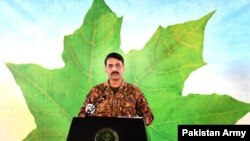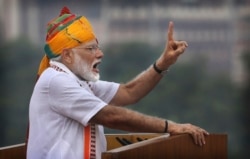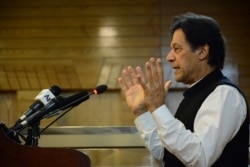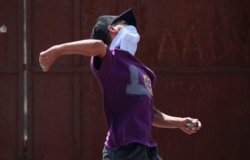Pakistan warned Wednesday that India was "sowing the seeds" of another war in the region through its controversial actions in Kashmir, a disputed territory that has long been a flashpoint between the nuclear-armed rivals.
Indian Prime Minister Narendra Modi a month ago revoked a decades-old constitutionally provided limited autonomy for the two-thirds part of the divided Muslim-majority territory administered by India.
New Delhi also has since imposed curfew-like restrictions in Kashmir, deployed tens of thousands of additional troops there, cut off all communication and arrested thousands of people, including mainstream Kashmiri politicians and activists.
Now in its fifth week, the clampdown to quell violent protests in Kashmir has spurred severe international criticism of India.
Pakistan, which also controls a portion of Kashmir, swiftly denounced and rejected Indian actions, downgrading diplomatic as well as bilateral economic ties.
"India's actions in occupied Kashmir come at a time when the region as a whole is inching towards stability, but India is sowing the seeds of a new war," Pakistani army spokesman Maj. Gen. Asif Ghafoor told reporters Wednesday.
Ghafoor explained that Pakistan has successfully fought domestic terrorism and it is now closely cooperating with the United States to facilitate a political settlement to the 18-year-old war in neighboring Afghanistan to promote regional stability.
The Kashmir dispute has already triggered two wars between India and Pakistan, and their militaries regularly trade fire across the Kashmir border, known as the Line of Control.
Pakistani Prime Minister Imran Khan has warned that India could attempt to open another conventional war with his country to try to divert global attention from human rights abuses in Kashmir.
Ghafoor said Pakistan doesn't want war between the two countries. He reiterated Pakistan's stated stance that its nuclear weapons are for deference.
Khan, meanwhile, has reached out to world leaders, including U.S. President Donald Trump, to press the Modi government over settling the Kashmir issue. But India maintains its recent actions in its part of the disputed region are an "internal matter."
Modi has also defended his decision to bring Kashmir under federal rule, saying it would help bring economic development and prosperity to the region.
Khan has also described Modi as "facist" and "supremacist," comparing his Hindu nationalist government with Nazi Germany.
On Wednesday, the foreign ministers of Saudi Arabia and the United Arab Emirates met with Khan in Islamabad to discuss Kashmir.
India has long alleged Pakistan-based militant groups foment separatist violence and terrorism in Indian-administered Kashmir. Islamabad maintains it offers only political and diplomatic support for what it calls an indigenous Kashmiri struggle for freedom from Indian rule.
On Wednesday, armed forces and youth in Indian-held Kashmir's main city of Srinagar clashed after news broke that a student, who reportedly sustained bullet wounds during last month's protests, died from his injuries, the first confirmed civilian death since the region was stripped of its autonomy.
Analysts note that international media coverage of the recent events in Kashmir has been highly critical of India.
Michael Kugelman, a Washington-based expert on South Asian affairs, said India knows if it ends the prolonged lockdown in Kashmir, unrest is all but inevitable.
"Given New Delhi's awareness that the international media is already shining a critical lens on New Delhi's tactics in Kashmir, it doesn't want to have to face a situation where it needs to launch fresh crackdowns," Kugelman said.
That will severely undercut New Delhi's narrative of Kashmir being calm and normal and fully behind the central government, he added.








